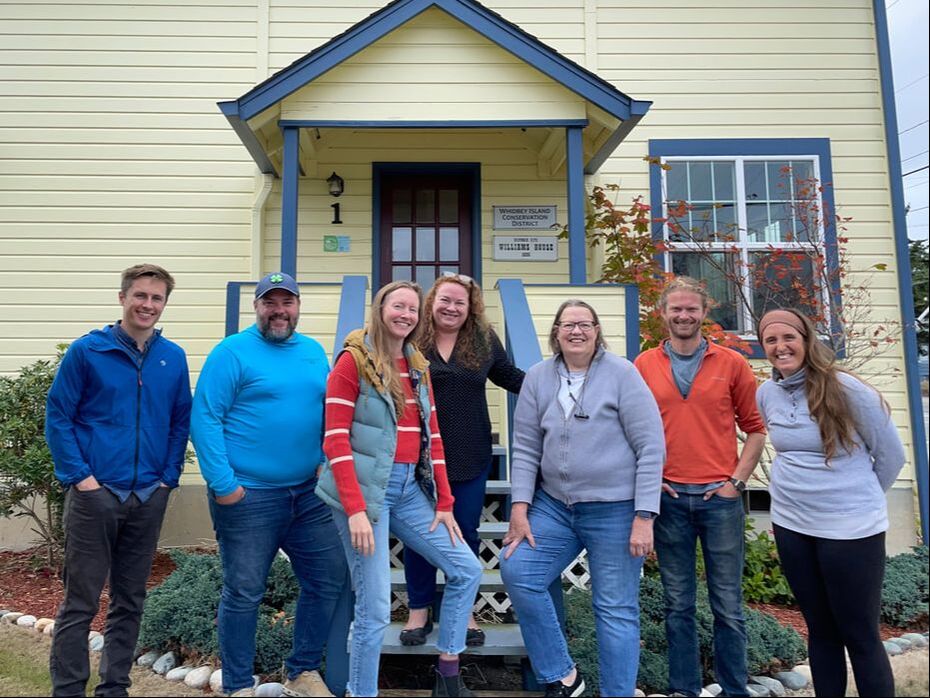Your local resource hub Whidbey Island Conservation District has been a leader for over 50 years in natural resource conservation education and technical assistance to Whidbey Island residents. We provide localized knowledge, educational resources, and financial assistance to our community. To learn about each of our programs, select from the list in the menu, or contact us to learn more.
|
Conservation Planning
Our trained conservation planners are committed to helping the island's residents and natural resources thrive. What exactly is conservation planning and how does it benefit you and your land? Conservation planning helps you "read your landscape" to learn about your land's challenges and opportunities from a complete system approach.
Our planners follow the 9-steps of conservation planning with you, at your own pace. Learn more about the history of conservation planning. Working with one of our conservation planners, you can address natural resource problems occurring on your land and identify opportunities for more effective management. We help clearly define and align your goals with tangible possibilities in a realistic timeframe, while protecting water, soil, and other natural resources.
Conservation plans are documents developed jointly by the Conservation District and land managers. The planning process takes into consideration the size of the parcel, type of soils, slope of the land, proximity to streams or water bodies, type of livestock or crops, and resources such as machinery, buildings and available finances. Then, we work together to develop specific actions you can take to achieve your land use goals.
Conservation planners look at changes that can be made to improve health and productivity while reducing impacts on natural resources. Some examples include stream-side fencing, riparian plantings, gutters and downspouts, rain gardens, composting manure, pasture management and renovation, weed management techniques, creating sacrifice areas, and rotation of livestock. Planners can help answer your questions, provide technical guidance, and recommend additional help such as financial assistance.
Once the land manager has decided which changes they’d like to make on their property, they work with their planner to set a tentative implementation schedule. Revisions of the schedule and the plan can be made as your goals and needs change. All aspects of conservation planning services provided by WICD are free of charge and without obligation as WICD is a non-regulatory, non-enforcement agency.
We look forward to introducing you to this process! Request assistance with the button below to get started.
Our planners follow the 9-steps of conservation planning with you, at your own pace. Learn more about the history of conservation planning. Working with one of our conservation planners, you can address natural resource problems occurring on your land and identify opportunities for more effective management. We help clearly define and align your goals with tangible possibilities in a realistic timeframe, while protecting water, soil, and other natural resources.
Conservation plans are documents developed jointly by the Conservation District and land managers. The planning process takes into consideration the size of the parcel, type of soils, slope of the land, proximity to streams or water bodies, type of livestock or crops, and resources such as machinery, buildings and available finances. Then, we work together to develop specific actions you can take to achieve your land use goals.
Conservation planners look at changes that can be made to improve health and productivity while reducing impacts on natural resources. Some examples include stream-side fencing, riparian plantings, gutters and downspouts, rain gardens, composting manure, pasture management and renovation, weed management techniques, creating sacrifice areas, and rotation of livestock. Planners can help answer your questions, provide technical guidance, and recommend additional help such as financial assistance.
Once the land manager has decided which changes they’d like to make on their property, they work with their planner to set a tentative implementation schedule. Revisions of the schedule and the plan can be made as your goals and needs change. All aspects of conservation planning services provided by WICD are free of charge and without obligation as WICD is a non-regulatory, non-enforcement agency.
We look forward to introducing you to this process! Request assistance with the button below to get started.
|
Learn about our Conservation Planning process
|

